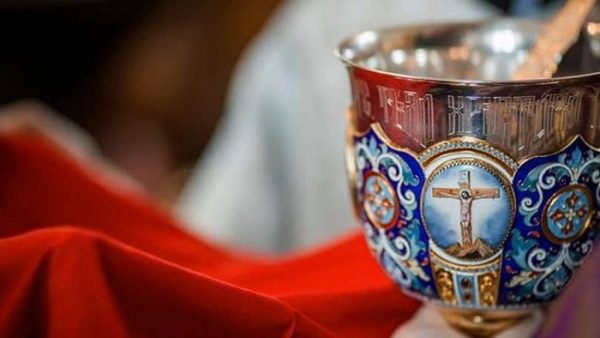The word of the day is “partake.” What does our partaking of the Holy Body and Blood of Christ mean for our participation in other ways of sharing in spiritual things? In today’s reading of 1 Corinthians 10:12-22, St. Paul returns to the topic of eating food offered to idols. He states emphatically, “You cannot drink the cup of the Lord and the cup of demons.” You cannot partake of the Lords’ table and the table of demons (vs. 21). In today’s reading, Paul teaches that because of the temptation of idolatry, one should not eat meat that has been sacrificed on pagan altars. We will find that this principle also applies to us and our participation in rituals, activities, and behavior in which we share beliefs, values, and emotions that are not compatible with our participation in the Holy Communion.
In his previous discussion of pagan food, Paul seemed to agree with those claiming the superior knowledge that idols are “nothing” (1Cor. 8:1). But his point then was that those who knew that idols were just wood or stone should not use their understanding to tempt their weaker fellow members. They should refrain from eating idol food for the sake of those who have scruples about the association of meat with pagan worship.
The Question of Eating the Food Itself
But now, St. Paul returns to the matter and changes course. This time the apostle addresses the question of eating the food itself. He takes his principle from the Eucharist. The eating and drinking of the Holy Gifts of the Eucharist is a communion of and in the Body and Blood of Christ.
The word for “communion” can be translated as “participation in” or “sharing in” (Strong’s #2841). Thus, when we commune with others in the Holy Gifts, we participate in a sacred reality that transcends and unites us (Strong’s #2844). Therefore St. Paul writes, “for we, though many, are one bread and one body, for we all partake of that one bread,” the Bread of Heaven.” When we “partake” or share in the Holy Communion, we have the very Body and Blood of Christ in common. We become spiritually and physically one Christ and with one another in this way.
With this Eucharistic theology in mind, St. Paul applies his insight to eating food sacrificed to idols. He states emphatically, “You cannot drink the cup of the Lord and the cup of demons.” You cannot partake of the Lords’ table and the table of demons” (vs. 21).
Idols Are Nothing, But Worship of False Gods is Idolatry
What? Is Paul contradicting himself? The apostle has said that idols are nothing. But Paul now finishes the thought. Idols are nothing, but the worship of false gods is idolatry. And idolatry is a grievous sin against the One, True God, the Creator of Heaven and Earth. The Almighty is “jealous” (vs. 22) in the sense that He will not tolerate anything in His creation to receive the thanks, praise, and devotion due to Him alone.
Let’s put the thought this way. Wherever there is idol worship, demons are lurking around, seducing the participants, and rejoicing in their sin. Thus, to partake of idol food is to enter into the domain of demons. One may think that the idol is not real. However, the demons that tempt one to worship false gods do exist. And eating idol food is “having fellowship,” that is, “communion,” with demons. In other words, to keep company with devils (vs. 20) who glory most of all in the sin against the first commandment.
In conclusion, our passage began with the thought that the Lord does not allow us to be tempted beyond our strength to withstand it. God always provides a way out to resist the temptation and rebuke the temper (vs. 13). In this case, the way out is not to expose oneself to the temptation of idolatry in the first place. St. Paul’s advice here is to avoid idol meat and, by extension, to shun pagan temples.
For Reflection
As he addresses eating food offered to idols, Paul gives us some profound insight into the Eucharist. But he also provides a principle against the temptation to participate in spiritually unhealthy and unwholesome pursuits and activities. In the same way, St. Macarius of Optima said, “Avoid making idols of either things or practices” (Orthodox Church Quotes, Word Press).
How Do We Make Idols Today?
How do we make idols in our time? Whenever organizations, behaviors, and enterprises claim the commitment and loyalty that belongs to God alone, they tempt us to idolatry. When anyone or anything demands our ultimate dedication, we can be sure that the demons are hovering around us. For dedication is worship. When we join in a group, ambition, or habit whose spirit carries us away and controls us, we can be assured that the devil has recruited us.
To escape this kind of temptation, Paul counsels that we must stay away from participation in everything that denies and betrays the oneness of the Almighty. And we should prayerfully and faithfully participate in what cleanses and renews us in the true worship of the One God–the Holy Communion in the Body and Blood of Christ.

















